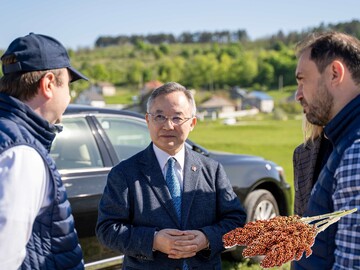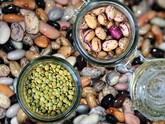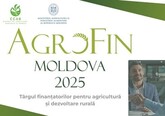
The FAO, with support from the Japanese government, has finished giving out 6 tons of sorghum seeds to 280 small farmers in 21 districts of Moldova
The Ministry of Agriculture and Food Industry shared this news, noting that this action is part of the project “Emergency assistance to mitigate the effects of extreme drought through the distribution of sorghum seeds and animal feed,” launched in April this year by the Food and Agriculture Organization of the United Nations in collaboration with the Ministry of Agriculture. The project aims to increase farmers' resilience to harsh climatic conditions. According to the Ministry of Agriculture, last July's extreme heat, as well as the severity of previous droughts, had a negative impact on the country's agriculture, causing crop losses and affecting farmers' livelihoods. One of the first distribution points, where 730 kg of sorghum seeds were handed out, was Hincesti, where farmers from the Hincesti, Leova, and Cimislia districts gathered on May 2, along with Vasile Sarban, State Secretary of the Ministry of Agriculture and Food Industry, Japanese Ambassador to Moldova Yoichiro Yamada, FAO Deputy Representative in Moldova Tudor Robu, and representatives of local authorities. Between May 2 and 5, sorghum seeds for grain or silage were delivered to 280 farmers, each of whom will cultivate up to 8 hectares of land in the districts of Cahul, Comrat, Basarabeasca, Stefan Voda, Causeni, Hincesti, Leova, Cimislia, Criuleni, Orhei, Rezina, Telenesti, Calarasi, Sincereu, Ungheni, Soldanesti, Floresti, Drochia, Falesti, Glodeni, and Riscani districts. The total value of the seeds distributed at this stage is approximately 3.5 million lei. The project is expected to have a significant impact on the resilience of farmers in Moldova. Sorghum is a drought-resistant crop that can serve as both a highly nutritious feed for animals and a source of income for farmers. By diversifying crops and introducing climate-optimized farming methods, farmers will be better prepared to address future climate challenges. The project, with a total value of $560,000, will run until March 2026. Its goal is to help more than 1,000 farmers (approximately 700 from the livestock sector and 400 from the crop sector) adopt climate-optimized farming practices, diversify their agricultural production through the introduction of drought-tolerant sorghum, and provide high-quality animal feed. // 06.05.2025 — InfoMarket







